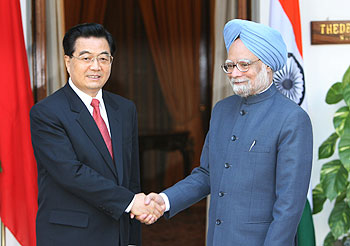China, India pledge to expand co-op on regional, int'l stages
22/11/2006 9:17

Chinese President Hu Jintao (L) shakes hands with Indian
Prime Minister Manmohan Singh before holding talks in New Delhi, capital of
India, yesterday. During the talks, the two leaders reached an important
consensus on developing their strategic and cooperative
partnership.-Xinhua
China and India pledged to expand cooperation on both regional and
international stages, said a joint declaration issued by the two countries
yesterday.
The two sides should have regular exchanges of views on the emerging security
environment in the Asia-Pacific region and the world, and proactively consult
each other on issues of immediate and emerging concern, said the declaration
released here during Chinese President Hu Jintao's state visit to India.
The two sides should also have regular consultations on issues pertaining to
regional peace, security and stability, such as regional maritime security,
proliferation of weapons of mass destruction and related materials and their
means of delivery, said the declaration.
According to the document, the two sides should positively assess the
trilateral dialogue mechanism between China, India and Russia and agree that
exchanges and cooperation should be further substantiated.
Additionally, the two countries condemned all forms of terrorism and agreed
to broaden and deepen the China-India Dialogue Mechanism on Counter Terrorism,
as well as strengthen bilateral and international cooperation to fight
terrorism, separatism and extremism.
In the declaration, the two sides recognize the central role of the United
Nations in promoting international peace, security and development, and
reiterate their determination to strengthen the U.N. system.
The reform of the U.N. should be comprehensive, ensure balanced
representation of developing and developed countries in the U.N. Security
Council, and improve its working efficiency, the declaration said, adding that
the two sides should conduct consultations on the reform of the U.N., including
the reform of the Security Council.
It is consistent with the common interests of the two sides to establish an
international energy order, which is fair, equitable, secure and stable, and to
the benefit of the entire international community.
China and India would strive for bilateral and international cooperation to
diversify the structure of global energy and to increase the share in it of
renewable energy sources, it said.
International civilian nuclear cooperation should be advanced through
innovative and forward-looking approaches, while safeguarding the effectiveness
of international non-proliferation principles, according to the declaration.
Both countries are committed to non-proliferation objectives and agree to
expand their bilateral and international cooperation on the related issues.
The two sides agreed to strengthen their cooperation in the World Trade
Organisation, the declaration said. Both countries support the establishment of
an open, fair, equitable, transparent and rule-based multilateral trading
system, as well as early resumption of Doha negotiations.
China and India are determined to safeguard the legitimate rights and
interests of developing countries, according to the declaration.
In the declaration, the two sides also agreed to expand their coordination
within regional organizations and explore a new architecture for closer regional
cooperation in Asia.
Both sides consented to cooperate closely in the East Asia Summit, the
declaration said.
The Indian side recalls that India was among the first countries to recognize
that there is one China. The country said that its one China policy remained
unaltered and it would continue to support the one China policy.
India reiterates that it has recognized the Tibet Autonomous Region as part
of the territory of the People's Republic of China, and that it does not allow
Tibetans to engage in anti-China political activities in India.
The Chinese side expresses its appreciation for the Indian position.
This is the first visit to India by a Chinese head of state in 10 years. And
India is the third leg of Hu's four-nation tour, which has already taken him to
Vietnam and Laos, and will also take him to Pakistan.
Xinhua News
|



